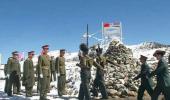The Indian Army has categorically conveyed to China's People's Liberation Army at the fifth round of military talks it will not compromise on India's territorial integrity, and clearly said disengagement of troops from Pangong Tso and a few other friction points in eastern Ladakh should be completed at the earliest, people familiar with the developments said on Monday.

Senior commanders of the two armies held intense negotiations for nearly 11 hours on Sunday at a designated meeting point in Moldo on the Chinese side of the Line of Actual Control.
The Indian delegation very clearly and firmly communicated to the Chinese side that restoration of status quo ante in all areas of eastern Ladakh was key for overall ties between the two countries, and that Beijing must ensure complete disengagement of its troops from the remaining friction points, according to the people familiar with the developments.
It was also categorically conveyed that the Indian Army will not compromise on the country's territorial integrity, they said.
The Chinese army has pulled back from Galwan Valley and certain other areas but the withdrawal of troops has not moved forward from the Finger Four and Eight areas in Pangong Tso as demanded by India. The mountain spurs in the area are referred to as Fingers. China also has not completed withdrawal of troops from Gogra areas.
The focus of the Sunday talks was on finalising the modalities for further de-escalation, and disengagement of troops from various friction points, sources said, adding both sides were to discuss details of the negotiations with their respective military and political leadership.
The sources said Army Chief Gen MM Naravane was given a detailed briefing about the talks on Monday morning which was subsequently followed by a discussion he held with senior military officials on the overall situation in eastern Ladakh.
It is learnt that National Security Advisor Ajit Doval and External Affairs Minister S Jaishankar were also apprised about the talks, and the entire military and strategic brass tasked to deal with the border row is deliberating on various aspects of the overall situation.
The Indian delegation was led by Lt Gen Harinder Singh, the commander of the Leh-based 14 Corps, while the Chinese side was headed by Major General Liu Lin, commander of the South Xinjiang military region. The previous round of the Corps Commander-level talks took place on the Indian side of the LAC on July 14 and it lasted for nearly 15 hours.
There was no official word on details of the meeting.
The military talks took place 10 days after both sides held another round of diplomatic parleys on the border issue.
After the diplomatic talks, the ministry of external affairs said both sides agreed that an early and complete disengagement of the troops along the LAC in accordance with bilateral agreement and protocols was essential for the overall development of bilateral relations.
Last week, India rebutted China's claim that the disengagement process was completed at most locations.
"There has been some progress made towards this objective but the disengagement process has as yet not been completed," MEA spokesperson Anurag Srivastava said when asked about China's claim.
In the last three weeks, India has significantly ramped up troops and weaponry in the areas around Daulat Beg Oldi and Depsang Valley in commensurate with deployment of troops by China's People's Liberation Army.
During the military and diplomatic talks, India has also been demanding withdrawal of Chinese troops from Depsang, the area where they had intruded in 2013.
The transgressions had created military and diplomatic tensions but was resolved after hectic rounds of negotiations following which the Chinese troops withdrew.
India began sending reinforcements to Depsang and the areas around DBO in mid-May when tension between the two sides gradually escalated, and the deployment has been significantly ramped up with several thousand troops, tanks and artillery guns in the last two months, sources said.
The formal process of disengagement of troops began on July 6, a day after a nearly two-hour telephonic conversation between NSA Doval and Chinese Foreign Minister Wang Yi on ways to bring down tension in the face-off points.
The first round of the Lt General talks was held on June 6 during which both sides finalised an agreement to disengage gradually from all the standoff points beginning with Galwan Valley.
However, the situation deteriorated following the Galwan Valley clashes on June 15 in which 20 Indian Army personnel were killed as the two sides significantly bolstered their deployments in most areas along the LAC.
The Chinese side also suffered casualties in the clashes but it is yet to give out the details. According to an American intelligence report, the number of casualties on the Chinese side was 35.
The second round of military talks took place on June 22.
At the third round of military talks on June 30, both sides agreed on an "expeditious, phased and step wise" de-escalation as a "priority" to end the standoff.
Following the Galwan Valley incident, the government has given the armed forces "full freedom" to give a "befitting" response to any Chinese misadventure along the LAC.
The Indian Air Force has also moved air defence systems as well as a sizable number of its frontline combat jets and attack helicopters to several key air bases.











 © 2025
© 2025